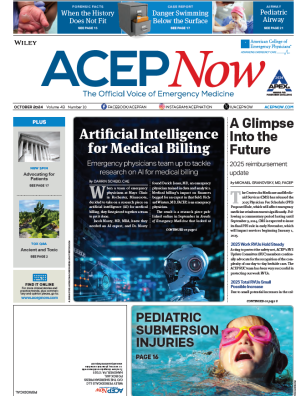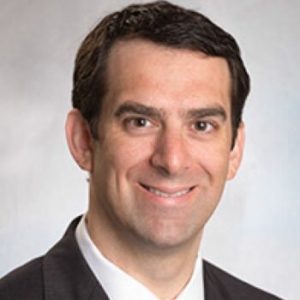The patient did not look happy to see me. “Great, another doctor,” she said. “Where’d you come from?”
Explore This Issue
ACEP News: Vol 32 – No 10 – October 2013“He sent me,” I said, gesturing over my shoulder to the attending.
For some reason, that prompted her to go from scowling to smiling. “Oh! You’re a special kind of doctor,” she said – and from there on, our interaction was warm and affectionate. I was confused, but I went with it. It wasn’t until the next morning, during my daily pre-rounding – I was on an off-service medicine rotation – that I realized what had happened. When I walked in to say “Good morning!,” she greeted me as “my guardian angel doctor.”
I’m sure I looked puzzled, but she went on: “I knew you were special the moment we met because when we met, you said HE sent you.”
She pointed skyward. “When you said that, I knew you were meant to be my doctor.”
It was only then I realized that she had thought I had been pointing not to my attending, but to the heavens. You know, toward her Lord and personal savior. Just as I was about to correct her, I saw her joyous face and stopped myself. I didn’t have the heart to tell her I’m not exactly the church-going type. “I did say that, didn’t I?” I said, smiling, realizing that our miscommunication in the emergency department had provided an unexpected windfall.
A bond had been made, and it worked for us both.
In medicine, religion more often creates a barrier between doctors and patients than an alliance, since we’re often treating patients from backgrounds different from our own. While patient variety is one of the reasons many doctors were attracted to emergency medicine in the first place, it also presents challenges. Many doctors think of themselves as “culturally competent,” but few of us truly are.
Studies show that health care providers are aware of cultural issues and possess relevant knowledge, but are often unable to act on them in practice. Working in a hospital in a neighborhood where approximately 150 languages are actively spoken, with patients representing religions I’ve never even heard of (and I was raised in San Francisco, where they literally just go ahead and make up religions), I am forced to face my cultural incompetence on a daily basis.
If we’re being honest with ourselves, we have to confess that self-assessments of cultural understanding are probably about as accurate as judging one’s own sense of humor. Let’s face it, we could all use a little bit of work.
Pages: 1 2 3 | Single Page




No Responses to “Religious Experiences in the ED”